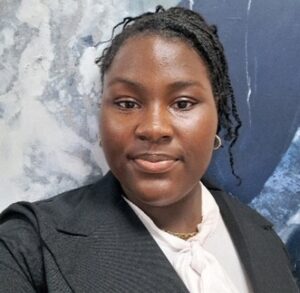2026 CARIBBEAN STEM OLYMPIADS

This Webpage contains 10 Sections:
1.0 Overview
2.0 CSO Rules and Regulations
3.0 Medals and Prizes
4.0 CSO 2026 Agenda
5.0 The 2026 Math Olympiad
6.0 The 2026 Computer Coding Olympiad
7.0 The 2026 Robotics & Electronics Systems Olympiad
8.0 CSO 2026 Registration and Application Process
9.0 Frequently Asked Questions
10.0 Contact Us
1.0 OVERVIEW
The Caribbean Science Foundation (CSF) will be holding the fourth annual Caribbean STEM Olympiads from 12-18 January 2026. Currently, the CSO are open only to citizens of CARICOM and CARICOM-Associate countries (not observer countries) who meet one of the age requirements. The CSO are also open to residents who have been living in a CARICOM or CARICOM-Associate country for the last 4 consecutive years, where January 15th of the year of the Olympiads is the benchmark for the end of the 4 year period.
The 2026 Caribbean STEM Olympiads feature competitions in three categories:
- Math Olympiad
- Computer Coding Olympiad (aimed at solving a challenge faced by Caribbean communities)
- Robotics & Electronics Systems Olympiad (where projects must be hardware dominant)

Within each category, there are three age levels (referenced to January 1st of the year of the Olympiads):
- Level I for ages 13-15
- Level II for ages 16-18
- Level III for ages 19-21
Thus, in total there are nine (9) competitive events of the Caribbean STEM Olympiads. (see CSO 2026 Agenda below for details)
1.1 Definitions
- “Applicant” refers to the student participating in a Caribbean STEM Olympiads (CSO) event (It does not refer to the school/teacher/coach/principal/administrator).
- “Category” refers to either the Math Olympiad, the Computer Coding Olympiad or the Robotics & Electronics Olympiad.
- “Event” refers to a specific Level (I, II or III) of a category. Thus there are 9 events.
- “Team” refers to an individual applicant or a group of applicants competing together under the same team name. A team may enter any event as an independent competitor (not affiliated with an institution) or as an official representative of an institution.
- “Institution” refers to any school, club, association or organised group of individuals. Teams or individuals entering the CSO may represent themselves (independent) or may represent their school/club/institution. For a team to be recognized as representing an institution, the team must be formally endorsed by the institution via this form.
- “Endorser” refers to a STEM teacher, teacher, coach, principal or an appropriate administrator of an institution who is endorsing a team in the CSO.
1.2 Objectives of the CSO
Science popularization initiatives are one of the most effective methods of engaging parents, students, teachers, and the public in STEM. The collection of Caribbean STEM Olympiads is one such annual initiative that aims to fulfill the commitment of enhancing the quality of secondary and tertiary science education in the Region while creating a technology-savvy workforce. Another aim of the CSO is to encourage more female participation in the STEM disciplines. All other things being equal, teams with a larger fraction of females will be given preference over all-male teams during the selection process for participation in the Olympiad events.
The primary objectives of the Caribbean STEM Olympiads are to:
- Assist with STEM education reform and science popularization in the Caribbean
- Raise community awareness of the importance of science and technology for job creation
- Provide informal learning opportunities in mathematics, coding, and robotics & electronics (especially for young women and at-risk youth)
- Ignite and nurture the STEM inventiveness in our youth
- Encourage students to pursue further studies in the STEM-related disciplines
- Give our medalists a competitive advantage on their university applications
- Attract more scientists, engineers, entrepreneurs, and world-renowned technology-academicians to the Region
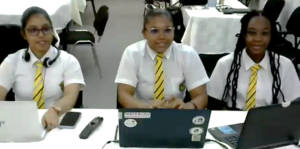
The Caribbean STEM Olympiads are designed to test the competitors’ creativity, their critical, logical and analytical thinking, their problem solving, leadership, and teamwork abilities, and in addition, their math, coding, robotics and electronics skills. As such, the Olympiads are designed to push students just above their comfort level. For example, in the Caribbean Math Olympiad the questions will not always align perfectly with the CSEC or CAPE syllabus by age level, because the CSF is trying to bridge the gap between Caribbean Math standards and those of other leading countries. It is not unusual for students to study or work on their own or in teams outside the classroom to compete in international Olympiad events, and the same is true for these Caribbean Olympiads, Typically, it is the exceptional teams that go on to compete in the finals of Olympiads.
Principals and teachers in CARICOM and CARICOM-Associate countries are encouraged to send teams of students to compete in the Olympiads. Teams from clubs and associations as well as independent competitors (not affiliated with a school/club/institution) are also encouraged to participate. Medal certificates and cash prizes will be awarded to the winning teams and individuals.
The Caribbean STEM Olympiads culminate with the Awards and Closing Ceremony. This is a formal virtual occasion which seeks to celebrate the participants in CSO. It recognizes their hard work and dedication to the projects, highlights their status as the best in the Region at their level, and inspires further advancements in the future. The ceremony is an opportunity to trace the medalists’ journeys through the Olympiads and present their awards. Sponsors, judges and staff will also be recognized for their contributions. It is anticipated that all participants will be present, and we encourage the medalists to share a few words on their experience. The Awards and Closing Ceremony is open to the public. Family, friends, teachers, coaches, mentors, the judges, and all other supporters are encouraged to attend.
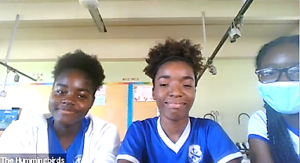
1.3 History
The Caribbean STEM Olympiads were previously held in January of 2023, January of 2024 and January of 2025. A summary of the Olympiad events detailing the activities and the winning teams by country, event and age level can be found in the 2023 CSO press release, the 2024 CSO press release and the 2025 CSO press release. The 2023 press release also contains links to short video highlights of the Math Olympiad events.
1.4 Information Sessions for CSO 2026
To aid in preparation for the 2026 Caribbean STEM Olympiads (CSO), the Caribbean Science Foundation (CSF) will be hosting four Informational Sessions for interested persons. These sessions will:
- Provide more information on the events of the Olympiads
- Give clarification on the rules, entry requirements, the judging process, and more
- Allow interested persons to ask questions and raise concerns
The dates, times and recurring Zoom links for these Informational Sessions are listed in Section 4 at the top of the CSO 2026 Agenda.
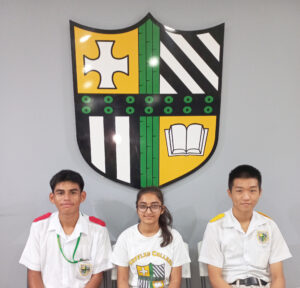
1.5 Registering Early
We strongly encourage applicants to form their teams and apply to the 2026 CSO early using the online Forms 1 and 2 (link to Form 1 in Section 8). As detailed below in the CSO 2026 Registration and Application Process section, a complete application consists of applicants filling out at a minimum two Google forms; Form 1 (Personal Registration Form), and Form 2 (Events Application and Declarations Form).
To encourage applicants to get started early, the CSF is offering the following benefits to math, coding and robotics & electronics teams. Please note that these benefits are on a first-come-first-served basis and the earlier you apply, the more likely you are to benefit.
- A one-on-one session with the CSF Planning Committee and/or one of the judges to discuss your project (for coding, robotics & electronics systems) or receive study tips (for math).
- Assistance with finding a team member. Please note that this is also subject to the number (and country) of applicants in the pool who are also seeking team members.
- Additionally, the first six teams in each level of the Robotics & Electronics Systems Olympiad to: (a) submit a complete application before the event application deadline, and (b) have demonstrated substantial progress on their robot or electronics system, are eligible to receive an Amazon gift card. Eligible teams will receive additional information about claiming their gift card (also see Financial Assistance For Needy Robotics & Electronics Systems Teams below).
1.6 Financial Assistance For Needy Robotics & Electronics Systems Teams
The first six teams in each level of the Robotics & Electronics Systems Olympiad to: (a) submit a complete application before the event application deadline, and (b) have demonstrated substantial progress on their robot or electronics system, are eligible to receive an Amazon gift card valued at US$100 to Level I, US$ 125 to Level II, and US$ 150 to Level III. The purpose of the funds is to assist the most needy teams in acquiring materials and components early enough to advance their projects. The team leader may apply for financial assistance by submitting Form 4 (Financial Assistance form) which can be accessed via a link that will be provided after the submission of Forms 1 and 2. Submitting this form is optional since not all Robotics & Electronics Systems applicants will need or will qualify for financial assistance. Projects granted financial assistance are not automatically admitted to the finals. All applicants for financial assistance must have a recommendation from a teacher/coach/mentor/ guidance counselor/other appropriate person via the Institution Endorsement Form. The deadline for applications for financial assistance is 15 October 2025. Teams seeking financial assistance will need to register early.
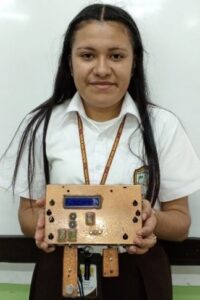
1.7 The Judges
The CSF invites persons, known to be experts in their field, to be judges. There is no application form for judges. Potential judges for the Olympiads will be carefully screened so they have no conflict of interest. They will be selected from the private sector, universities and the government sector, and the audience in some special cases.
Persons interested in serving as judges should send an e-mail to warde.csf@gmail.com specifying the event on which they are offering to serve as judge, along with a recent copy of their CV as an attachment. If the CV does not have much detail, a separate paragraph explaining their experience or qualifications would be helpful.
For the Math Olympiad, current and prospective judges, and all interested experts are asked to contribute math questions (with solutions) or suggest new topics that are matched to the age levels. Contributed materials should be sent to warde.csf@gmail.com.
1.8 Mentor Engagement
For all the above Olympiad events, in addition to the assistance offered by your teacher or your peers, contestants may want to seek assistance from one or more mentors who are experts in the area of your project. Contestants should think of the mentors as your consultants on the project. It is the responsibility of the teams or individuals to leverage their mentoring resources. Your mentors or coaches do not have to be from the Caribbean. If you are having difficulties finding a mentor, you may ask the Caribbean Science Foundation to suggest some possible mentors. We will do our best to help!
1.9 For Sponsors
The CSF invites interested sponsors to provide the prizes for the CSO. In particular, the prizes to the winning teams and individuals could consist of cash, and technology-related prizes such as science kits, computers, printers, books, software licenses, or gaming devices, etc. We view our sponsors as our partners in making an investment in supporting and grooming the next generation of Caribbean STEM professionals. Sponsors also have the option to select which categories they want to fund, or they may choose to contribute to the general pool of CSO activities, including the direct costs of planning and staging the events. Sponsors are also encouraged to propose problems whose solutions may be of interest to them, and we will consider adding them as CSO challenges for the participants.
2.0 CSO RULES AND REGULATIONS
2.1 Team Composition
A “team” may refer to an individual applicant or a group of applicants. The Math Olympiad may have up to 3 members per team while the Computer Coding and Robotics & Electronics Systems Olympiads may have up to 4 members per team. Each member must be an active participant on the team. For the Math Olympiad and the Robotics & Electronics Systems Olympiad all the team members must be in the same room during the competitions. For the Computer Coding Olympiad team members may be in different locations, even different countries, during the competitions. Please note that for the CSF Computer Coding Olympiad only, citizens from different countries may be on the same team.
2.2 Substitutions
Substitutions can be made up to the start of the preliminary rounds (see CSO Agenda). For all substitutions, both the person being substituted and the substituting person, must notify the CSF of the change via an email to applications.csf@gmail.com. All substituting persons must have submitted a complete application before the deadline (see CSO 2026 Registration and Application Process). If the application deadline has passed, the forms will no longer be available. In this case, the CSF will provide instructions on how to proceed. All substitutions must meet the citizenship (or residence) requirement and age requirement for the particular level. All substitutions are subject to approval by the CSF.
2.3 Institution Endorsements
Teams entering the Caribbean STEM Olympiads may represent themselves (independent) or may represent their school/club/institution. For a team to be recognized as representing a school/club/institution, the team must be formally endorsed by the school/club/institution via the Institution Endorsement Form. This form will be shared directly with a STEM teacher, coach, principal or an appropriate administrator (endorser) of a school/club/institution who is endorsing the team. Please note that each institution will be limited to one team per event. The CSF reserves the right to confirm the endorsement of the school/institution.
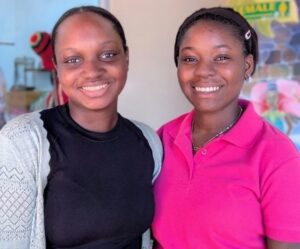
2.4 Use of Generative Artificial Intelligence (AI) Tools
The use of generative artificial intelligence (AI) tools in the Math Olympiad is strictly not allowed, and its use is grounds for disqualification.
The use of generative AI tools in the Computer Coding Olympiad and the Robotics & Electronics Systems Olympiad is not restricted. However, the preference is for participants to write as much of the code themselves, to the extent possible. Innovativeness and inventiveness are major criteria in the judging process, and the generous use of generative AI tools will not add much to the innovativeness component of your team’s score. The judges keep abreast of advancements of generative AI technology and can easily spot where AI tools have been used in coding. If you choose to use AI, it is recommended that you share what exactly was used, how its use helped you to better focus on achieving results, and clearly indicate where you implemented your own innovation.
2.5 Conduct During the Olympiads
- Disruptive or distracting behavior will not be tolerated during any event of the CSO (information sessions, preliminaries, communications systems checks, Olympiads or Awards and Closing Ceremony).
- Any CSO participant displaying such behavior will be issued one warning. If the behavior persists, the participant will be removed from the Zoom meeting by the host and disqualified from the Olympiads.
- Any observer or attendee displaying such behavior will be removed from the Zoom Meeting by the host.
2.6 Devices and Services Needed for Participation
The CSO takes place virtually via Zoom. For these virtual events, the teams may choose any venue that has reliable, high-bandwidth internet. Venues may be a room in your home or in a school or office, but the venue must be a well lit, quiet environment (no barking dogs or noisy crowds nearby), and have a simple, plain, non-distracting background.
Teams will be required to logon to the Zoom platform with 2 computers, or with one computer and one image-capturing device (cell-phone/tablet) running on the Zoom platform. One computer will be dedicated to displaying the contestants’ faces and voices at all times, and the second image-capturing device or computer will be used for submitting your answers to questions asked, or to show demos of your code, or your robot in action. Please note that for the Math Olympiad, 3 devices are preferred.

2.7 Summary of the Key Rules and Regulations
- Applicants are not allowed to enter events at a level below their age level.
- Applicants may enter in an event at their age level or the age level immediately above.
- Applicants may participate as an individual or as a group of applicants, both referred to as a ‘team’ in both cases.
- Teams entering the Caribbean STEM Olympiads may represent themselves (independent) or may represent their school/club/institution.
- Applicants are not allowed to participate in a category more than once.
- An applicant may enter up to a maximum of three events, one in each category.
- For a team to be recognized as representing a school/club/institution, the team must be formally endorsed by the school/club/institution via Form 3 (Institution Endorsement Form). The form is accessible HERE.
- Each school/club/institution is limited to one team per event.
- The use of calculators is not permitted in the Math Olympiad.
- The use of generative artificial intelligence (AI) tools in the Math Olympiad is strictly not allowed, and its use is grounds for disqualification.
- Applicants must have reliable, high-bandwidth internet and a well-lit and quiet environment..
The CSF reserves the right to confirm the endorsement of the school/institution.
3.0 MEDALS AND PRIZES
| CSO Event | Medals for Winning Teams in Levels I – III | Medal certificates, cash and in-kind awards for winners, as appropriate, depending on sponsorship |
| Math Olympiad | · Platinum · Gold · Silver · Bronze |
· Medal Certificates · Up to US$ 500 to each medalist or team · Science kits, laptops, printers, books, software licenses, or gaming devices, etc. (sponsor dependent) |
| Computer Coding Olympiad | · Platinum · Gold · Silver · Bronze |
· Medal Certificates · Up to US$ 500 to each medalist or team · Science kits, laptops, printers, books, software licenses, or gaming devices, etc. (sponsor dependent) |
| Robotics & Electronic Systems Olympiad | · Platinum · Gold · Silver · Bronze |
· Medal Certificates · Up to US$ 500 to each medalist or team · Robotics kits, laptops, printers, books, software licenses, or gaming devices, etc. (sponsor dependent) |
3.1 Distribution of Medal Certificates
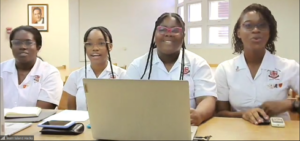
- Platinum medal certificates may be awarded to exceptional Math Olympiad teams (i.e., teams who have earned a score between 95% – 100% as determined by the judges). However, if more than one team scores between 95% and 100% the platinum medal goes to the team with the highest score.
- In any level of the Math Olympiad, if there is no platinum medalist, medal certificates will be distributed based on the final scores. The highest scoring team will receive the gold award, the next highest will receive the silver award, and the third highest will receive the bronze award.
- In fully subscribed events (3 teams or more), the medal certificates will be distributed based on the ranking of the teams’ final scores: the highest scoring team will receive the gold award, the next highest will receive the silver award, and the third highest will receive the bronze award. All other teams in the finals will receive finalist certificates.
- In under-subscribed events, (2 teams or less participating) a percentage grading system will be used to determine which medal is awarded. This will be calculated as a percentage of the total possible score based on the final score awarded by the judges. The percentages are mapped to the medals as follows: Platinum 95% – 100%; Gold 85% – 94%; Silver 75% – 84%; Bronze 65% – 74%, and Participation (no medal) 0% – 64%.
3.2 Appeals
- A team may appeal the scores allocated by the judges within 12 hours of the specific event. The appeal must be received by email to applications.csf@gmail.com and must include the names of all team members, Olympiad event, Olympiad Level, and description of appeal.
- The Judges involved will consider the appeal and release a decision before the Awards and Closing Ceremony.
- The decision of the Judges is final.
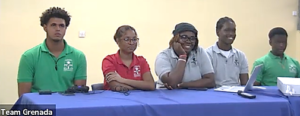
3.3 Prize Collection
- Each team that has earned a cash prize must supply the necessary information for the CSF to release the cash by February 28th of the same year, after which the cash prize will be deemed as forfeited.
- Each team that has been sent their cash prize must collect their cash by March 31st of the same year, after which the cash prize will be deemed as forfeited.
4.0 CSO 2026 AGENDA
The Table below contains a list of relevant dates for the 2026 CSO. Zoom links for the events can also be found below. Applicants will receive additional information about the preliminary rounds after the close of the Events Application period.
| CSO 2026 Information Session 1 | 14 September 2025, 7:00 pm AST (6:00 pm Jamaica)- https://us02web.zoom.us/s/86884952617 |
| CSO 2026 Information Session 2 | 21 September 2025, 7:00 pm AST (6:00 pm Jamaica)- https://us02web.zoom.us/s/86884952617 |
| CSO 2025 Information Session 3 | 12 October 2025, 7:00 pm AST (6:00 pm Jamaica)- https://us02web.zoom.us/s/86884952617 |
| CSO 2025 Information Session 4 | 16 November 2025, 7:00 pm AST (6:00 pm Jamaica)- https://us02web.zoom.us/s/86884952617 |
| Deadline for Applications for Financial Assistance in the Robotics & Electronics Systems Olympiad | Wednesday 15 October 2025 |
| Math Olympiad Events Application Deadline | 11:59 pm (AST), Sunday 30 November 2025 |
| Robotics & Electronics Systems Olympiad Events Application Deadline | 11:59 pm (AST), Sunday 30 November 2025 |
| Computer Coding Olympiad Events Application Deadline | 11:59 pm (AST), Sunday 30 November 2025 |
| Preliminaries Review Period for the Computer Coding Olympiad and the Robotics & Electronics Systems Olympiad entries (by the CSF Olympiad Review Committee) | Tuesday 02 December 2025 to Monday 15 December 2025 |
| Computer Coding Olympiad and Robotics & Electronics Systems Olympiad Finalists to be Notified | Tuesday 16 December 2025 |
| Preliminary Competitive Rounds for the Math Olympiad | Level I: Saturday 13 or Sunday 14 December 2025 Level II: Saturday 20 or Sunday 21 December 2025 Level III: Tuesday 16 or Thursday 18 December 2025 |
| Math Olympiad Finalists to be Notified | Monday 29 December 2025 |
| Deadline for Finalist of the Computer Coding Olympiad to Submit Updated Code and Additional Information (see the 2026 Computer Coding Olympiad) | Thursday 08 January 2026 |
| Deadline for Finalist of the Robotics & Electronics Systems Olympiad to submit Updated Demos and Additional Information (see 2026 the Robotics & Electronic Systems Olympiad) | Friday 09 January 2026 |
| Mandatory Communication Systems Checks for both Computer Coding and Robotics & Electronics Systems Olympiad Finalists (All three levels) – Choose one of the 3 time slots | week of 05 January 2026: 6:30 pm AST week of 05 January 2026: 6:30 AST week of 05 January 2026: 6:30 pm AST |
| Mandatory Communication Systems Checks for Math Olympiad Finalists (All three levels) – Choose one of the 3 time slots | week of 05 January 2026: 6:30 pm AST week of 05 January 2026: 6:30 AST week of 05 January 2026: 6:30 pm AST |
| Math Olympiad Finals | Monday 12 January 2026, 10:00 am – 6:00 pm AST https://us02web.zoom.us/s/86884952617 |
| Computer Coding Olympiad Finals | Wednesday 14 January 2026, 10:00 am – 6:00 pm AST https://us02web.zoom.us/s/86884952617 |
| Robotics & Electronics Systems Olympiad Finals | Thursday 15 January 2026, 10:00 am – 6:00 pm AST https://us02web.zoom.us/s/86884952617 |
| Medal Awards and Closing Ceremony | Sunday 18 January 2026, 2:00 to 4:30 pm AST – https://us02web.zoom.us/s/86884952617 |
The full agenda for the Finals and the Medal Awards and Closing Ceremony can be found HERE
5.0 THE 2026 CARIBBEAN MATH OLYMPIAD
The Math Olympiad is an annual STEM event in the form of a competition where teams with a maximum of 3 persons compete to solve math problems in a limited time frame in front of an engaging and enthusiastic audience. That is, the CSF Math Olympiads are more like a sprint rather than a marathon.

The questions for the Math Olympiad will cover various topics:
- Level I questions include: Consumer arithmetic, Number concepts, fractions and decimals, statistics and probability, algebra, elementary geometry
- Level II questions include: Algebra, coordinate geometry, introductory trigonometry, vectors, logarithms, exponentials, calculus, series and sequences, and probability
- Level III questions include: Series and sequences, Euclidean geometry and trigonometry, calculus, probability, matrices, complex numbers, and differential equations
Please note: the use of calculators is not permitted in the Math Olympiad. Also, the use of generative artificial intelligence (AI) tools in the Math Olympiad is strictly not allowed, and its use is grounds for disqualification.
The Math Olympiad finals will be run as a “Jeopardy” style contest using a professional software platform. Unlike the TV version of Jeopardy where contestants can choose the topics on which they wish to answer questions, in the Math Olympiad, teams are expected to answer all questions from a list of subtopics that fall under the main topic areas. The subtopics are listed below. A guide will be provided later to all Math Olympiad finalists on how to use the Jeopardy software, the number of devices required (2 or 3) and how to use them, the judging criteria, and how the Math Olympiad event will unfold.
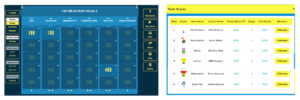
However, the first events of the Math Olympiad are the Preliminary Rounds. All teams that have complete applications are invited to the Preliminary Rounds. These will be held mid to late December (see CSO 2026 Agenda) and consist of about 10 to 12 questions in different areas of Math. The Jeopardy board is not used for the Preliminary Rounds. The goal is to reduce the field to the top 6 teams. If in any level of the Math Olympiad, 6 teams or less have applied, then all those teams will automatically advance to the finals.
There will be communication systems checks (see CSO 2026 Agenda) to make sure that your systems are working correctly so that you are not disadvantaged during the event(s). At these system checks, we will ensure that all teams have added their team name in front of their Zoom name, instruct teams on how to use the Jeopardy software and explain the way the game works, as well as answer any questions which the teams might have about the Math Olympiad.
5.1 Subtopics for the Math Olympiad
For general guidance, here is a table of the types of subtopics that may be included under each topic. Suggestions for new topics that are better matched on average to the age levels may be sent to warde.csf@gmail.com. As such suggestions come in from the different countries in the Region, updates may be made so the subtopics (and the questions). However, after 15 December 2025, the list will be frozen, and no further changes will be made.
| TOPIC | SUBTOPICS (updated 30 April 2025) |
| Level 1 (13 – 15 years) | |
| Consumer arithmetic | Purchase and sales, discounting, installment payments, depreciation, profit, price and quantity optimization, renting, income tax, simple interest, compound interest, currency conversion, etc. |
| Number concepts | Bases and powers; square and cube roots; fractional roots; real, prime, rational, irrational and composite numbers; simple sets, series and sequences; etc. |
| Fractions and decimals | Interpretation of fractions and decimals; conversion between fractions and decimals; fractions of fractions; addition/multiplication/division of fractions and decimals; etc. |
| Statistics & Probability | Mean; medium; variance; independent events; mutually exclusive events; simple probability calculations; etc. |
| Algebra | Variables; functions; solutions to single and double-variable equations; quadratic equations; applications to temperature conversion; travel distance-speed-time relations; etc. |
| Geometry | Rectangular coordinates, graphs; lines; triangles; rhombus; circles; perimeter; areas; etc. |
| Level II (16 – 18 years) | |
| Algebra | Polynomials; factorization; rapid graphing; variables; functions; solutions to multi-variable simultaneous equations; applications to computations in everyday life; etc. |
| Simple series and sequences | Summation; products; limits; interpolation; iteration, induction, etc. |
| Geometry | Coordinate geometry: Cartesian coordinates; properties of triangles, circles, polygons, cylinders and spheres; etc. |
| Trigonometry | Graphs of trigonometric functions; power series representations; triangle identities; Pythagorean identities; applications; etc. |
| Vectors | Addition; resultant vector; graphical representation; row and column vectors; dot product; etc. |
| Exponentials and Logarithms | Exponential functions; addition and multiplication; roots of exponentials; Products, quotients and roots of logarithms; change of base; graphing; power series representations; applications; etc. |
| Calculus | Limits and continuity; single variable calculus; differentiation and integration; etc. |
| Simple probability & statistics | Mutually exclusive events; not mutually exclusive events; conditional probability; special discrete distributions (Binomial, Poisson, Geometric), etc. |
| Level III (19 – 21 years) | |
| Series and sequences | Summation; products; limits; interpolation; induction; recursivity; etc. |
| Euclidean Geometry | Cartesian, cylindrical and spherical coordinates; axioms; theorems and use of theorems; intersecting lines; properties of circles, polygons, ellipses, cylinders, spheres; equations of surfaces; trigonometric and inverse trigonometric functions; etc. |
| Calculus | Single variable and multivariable calculus; differentiation and integration; functions of functions; applications to physics and engineering; etc. |
| Probability & statistics | Mutually exclusive events; not mutually exclusive events; conditional probability; special discrete distributions (Binomial, Poisson, Geometric) and special continuous distributions (normal, Chi-squared); etc. |
| Vectors and Matrices | Vectors in 3-dimensions; dot product and cross product; matrix inverse; transpose; determinant; vector-matrix and matrix-matrix multiplication; applications to solving linear equations; etc. |
| Complex numbers | Multiplication; exponentiation; square root; Euler’s formula; complex plane; vector interpretations; conjugation; inverse; applications in physics and engineering; etc. |
| Differential equations | Ordinary differential equations; first and second order; homogeneous and particular solutions; characteristic frequencies; basis vectors of solution space; connection to difference equations; applications in physics and engineering; etc. |
| Vector Calculus | Partial differential equations; gradient, divergence and curl and Laplacian operations; functions of complex variables; vector fields; divergence theorem; Green’s theorem; applications in physics, engineering and computer science; etc. |
5.2 Some Reference Materials For the Math Olympiad
By popular demand, we include here a set of sample questions with solutions, some of which are taken from previous Olympiads.
CSO Math Olympiad Sample Questions with Solutions.
The sample questions do not cover all the topic areas. 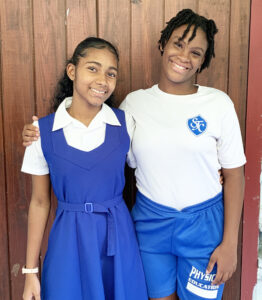
- CTS Mathematics book and related videos at http://uwitube.com
- Archive at https://archive.org
- MIT Open Courseware at https://ocw.mit.edu
- Libre Texts at https://libretexts.org
- OpenStax at https://openstax.org
- Euclid Examination past papers at https://www.cemc.uwaterloo.ca/contests/past_contests.html
- Paul’s Online Notes at https://tutorial.math.lamar.edu
- Khan Academy at https://www.khanacademy.org/
- The Student Hub at https://www.youtube.com/c/KerwinSpringer
Video clips from the 2023 CSO Math Olympiad can be found in the 2023 press release.
6.0 THE 2026 COMPUTER CODING OLYMPIAD
The Computer Coding Olympiad consists of a problem-solving journey where individuals or teams with a maximum of 4 persons compete to create the best comprehensive coding solution to a challenge of the region. It culminates in an event in which competitors showcase the coding solution they designed, built, and tested as well as its value in response to a regional challenge.
Please note that for the Computer Coding Olympiad only, citizens from different countries may be on the same team.

Projects entered in the Computer Coding Olympiad must be software dominant and are required to address a challenge faced by the Caribbean region. The 2026 Computer Coding Olympiad is focused on the development of tools such as Apps, websites, games, or data analysis that facilitate the solving of any of the challenges below which affect Caribbean communities:
- Food security and food safety
- Non-communicable diseases
- Energy production and consumption
- Transportation (inter- and intra-country)
- Safe after-hours transport for women and youth in the Region
- Money movement, fintech, financial education, investing, etc.
- Geohazards and climate change (e.g., hurricanes, earthquakes, and sea-level rise, etc.)
- Other (You may choose another challenge, but you must make it clear how it helps the Region. Entries that show little or no significance to a challenge of the Region will not be competitive)
Clearly, full solutions to these thorny challenges are not expected. However, your team must clearly explain how the problem you are solving fits into, or is relevant to, or facilitates a solution to a challenge of the Region. The judges will be looking for innovation and thinking outside the box, and of course, working code.

Level I projects may employ Scratch, although other programming languages such as Python may also be used. For Level II projects, Python is preferred, but other high-level languages will be accepted (not Scratch). Level III projects are open to any high-level software solution to the challenges posed (not Scratch).
The use of generative AI tools in the Computer Coding Olympiads is not restricted. However, the preference is for participants to write as much of the code themselves, to the extent possible. Innovativeness and inventiveness are major criteria in the judging process, and the generous use of generative AI tools will not add much to the innovativeness component of your team’s score. The judges keep abreast of advancements of generative AI technology and can easily spot where AI tools have been used in coding. If you choose to use AI, it is recommended that you share what exactly was used, how its use helped you to better focus on achieving results, and clearly indicate where you implemented your own innovation. Please note that teams are strongly encouraged to apply early (see Registering Early).
As specified on Form 2, your team must submit the following by the application deadline (30 November 2025) for assessment by the CSF Olympiad Review Committee:
- A description of your solution to your chosen challenge
- A user-friendly link to the file(s) for your code and website/ game/ video/ App, as appropriate, to show your code in operation. Links should be submitted for both the back-end of the code and the front-end/a demonstration of what a user of your website/ game/ video/ App would see. You should also include files of designs, flow charts etc., as appropriate to thoroughly describe your website/game/video/app. Please ensure that the link(s) to your code can be easily opened by commonly available software, and be sure to provide clear instructions on how to run your code (including a direct link to download the software, as appropriate).
A WORD OF CAUTION: The judges will be very busy as we anticipate a large number of applicants. The judges will not download and install specialty software to run your apps, website or games. It is up to you to take the time to repackage your submission so it does not annoy the judges and cause them to skip your submission. In other words, please make your submission as user friendly as possible (No more than 3 clicks are recommended).
We strongly recommend that you use a repository such as Github, Google Drive or Dropbox to store your code and website/ game/ video/ App, as appropriate, and then include that link in Form 2 (Events Application and Declarations Form). To make sure we receive them and can open your files, please choose the sharing option “Anyone with the link”. That is do not choose the “Restricted” option. Your link(s) will be shared only with the Judges and the CSF Olympiad Review Committee (CORC).
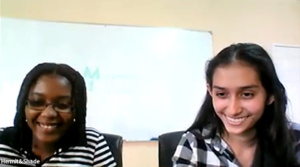
Preliminary Review of Computer Coding Applications
After the close of application period, submitted applications will be examined by the Judges during the Preliminaries Review Period (see Agenda). Teams will not be meeting with the judges during the Preliminaries Review Period, so the PowerPoint presentations of the teams should not be submitted at this time. For those projects that move on to the Finals, their PowerPoint presentations must be submitted before the Finals (see CSO 2026 Agenda).
After the Preliminaries Review Period, the teams selected for the Finals by the judges will be notified. These teams may continue working on their code up to the day of the Finals. All teams selected to compete in the Finals must attend a mandatory communication systems check (see CSO 2026 Agenda) to receive additional guidance and make sure that their communication systems are working properly (so that no team is disadvantaged during the Finals).
Finals of the Computer Coding Olympiad
At the Computer Coding Olympiad Finals, teams must present their coding project in such a way that all members of the team are visible and the code is visible on at least one of the team member’s laptops. Please note that even if team members are not in the same countries, we expect equal participation from each team member.
Teams and individuals invited to the finals must submit the following items at least 7 days before the Finals of the Coding Olympiad):
- An update of your code
- A revised written description of your project
- A video of your team presenting your project. This video may have the same content as your PowerPoint presentation and could include a demonstration of your code in action. This video will be played during the Finals if your team loses internet connectivity and is unable to present live.
- At least one photo of your team presenting your project (preferably with your code/ App/ website visible in the background) for advertising purposes.
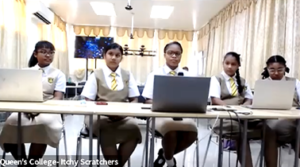
At the finals of the Computer Coding Olympiad, each team must:
- Give a PowerPoint presentation describing their project that also includes their software solution to their chosen challenge in the Region, its benefits to the Region, problems they encountered and how they were resolved, etc., or show a pre-recorded, updated video of their presentation – (5 min)
- Demonstrate their software in operation (with stills or video) – (5 min)
- Engage in Q&A with judges (10 min)
As a precaution, it is recommended that the finalists send a copy of their PowerPoint presentation by 11:59 pm on the night before the Finals to applications.csf@gmail.com.
Video clips from the 2023 CSO Computer Coding Olympiads can be found at the
CSO 2023 press release link
The judging criteria for the Computer Coding Olympiad include:
- How compelling is the project description (approach to the challenge and anticipated results/impact, etc.)
- Does the project seem like it could be completed in time for the Computer Coding Olympiad Finals (preliminary review only)
- Relevance of the project to addressing a challenge of the Region (technological, social, geographical, political, etc)
- Technical merit and inventiveness of approach/originality of project
- Performance level of the code
- Potential marketability and potential for wider application of the project (entrepreneurial strength)
- Clarity of the presentation and how well the questions were answered by the team (Finals only)
- Accessibility of the files via the links provided
7.0 THE 2026 ROBOTICS & ELECTRONICS SYSTEMS OLYMPIAD
At the 2026 Robotics & Electronics Systems Olympiad, teams with a maximum of 4 persons at the three age levels will showcase their custom robot builds or electronics projects, accompanied by a live presentation/demonstration of their projects. It should be noted that the CSF will NOT be providing robots or robotic kits to competitors due to the small operating budget of the organization. However, financial assistance may be provided to the most-needy teams that start immediately by pre-registering and filling out Form 3 (Financial Assistance Form) – see Financial Assistance For Needy Robotics Teams above.
Projects entered in the Robotics & Electronics Systems Olympiad must be hardware dominant. Projects in the robotics sub-category must have moving mechanical parts. Projects in the electronics systems sub-category may or may not have moving mechanical parts, and are required to address a challenge/application/unmet need (not necessarily faced by the Caribbean region). Electronics systems teams are strongly encouraged to include a clear statement about the challenge their system is solving to make sure the Judges understand the project’s usefulness to society. This will help to prevent the teams from being disadvantaged relative to the robotics entries whose usefulness may be inherently more evident. Electronics projects that are software dominant and that attempt to solve a challenge of the Region should be submitted under the Computer Coding Olympiad.
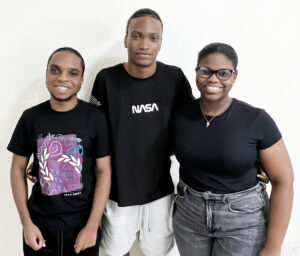
Contestants must make clear what problem is being solved and its importance. Innovativeness and efficacy of your solution, and commercial potential are among the attributes that the judges value most. On Form 2, applicants may designate the sub-category (robotics or electronics systems) for their project, however the CSF Olympiad Review Committee (CORC) reserves the right to reassign a project to the subcategory that is the best fit. Other important guidelines are:
- Level I robots may be built entirely from kits and the total cost of the parts must be less than US$ 300 (see note below). Although robots from this level can be built entirely from kits, we encourage innovation in the final design of the robot. Level I robot designs must be approved in advance by the CSF Robotics Olympiad Review Committee. Level I electronics systems parts also have the same $300 limitation.
- Level II robots will not be allowed to have more than 50% of the components built from snap-together kits, and the total cost of all purchased parts (from kits and otherwise) must be less than US$ 500 (see note below). Level II robot designs must be approved in advance by the CSF Robotics Olympiad Review Committee. Level II electronics systems parts also have the same $500 limitation.
- Level III robots are not allowed to be built from snap-together kits, and the total cost of all purchased parts must be less than US$ 700 (see note below). Level III robot designs must be approved in advance by the CSF Robotics Olympiad Review Committee. Level III electronics systems parts also have the same $700 limitation.
- During the application process, each team entering the CSF Robotics & Electronic Systems Olympiad must provide the estimated cost of the parts to be used in their robot or electronics system. This information is to be submitted in list form using this format: Item Number, Name of Part, Vendor, Cost, Purchaser. Please note the above maximum cost limits must be based on vendor catalog prices for new parts. However, the cost of batteries, as well as any miscellaneous parts and accessories costing less than US$ 5.00 each do not count in the total cost limit, and need not be reported in your itemized budget.
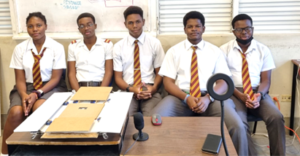
The use of generative AI tools in the Robotics & Electronics Systems Olympiad is not restricted. However, the preference is for participants to write as much of the code themselves, to the extent possible. Innovativeness and inventiveness are major criteria in the judging process, and the generous use of generative AI tools will not add much to the innovativeness component of your team’s score. The judges keep abreast of advancements of generative AI technology and can easily spot where AI tools have been used in coding. If you choose to use AI, it is recommended that you share what exactly was used, how its use helped you to better focus on achieving results, and clearly indicate where you implemented your own innovation.
Please note that teams are strongly encouraged to apply early (see Registering Early).
As specified on Form 2, your team must submit the following by the application deadline (30 November 2025) for assessment by the CSF Olympiad Review Committee:
- A written description of your robot
- A user-friendly link to a media (video) demonstration of your robot
- A link to your repository which has close-up photos of your robot or electronic system, and/or parts thereof, as it is today. You should include files of circuit diagrams, designs, flow charts etc., as appropriate to thoroughly describe your system.
We strongly recommend that you use a repository such as Github, Google Drive or Dropbox to store your code and website/ game/ video/ App, as appropriate, and then include that link in Form 2 (Events Application and Declarations Form). To make sure we receive them and can open your files, please choose the sharing option “Anyone with the link”. That is do not choose the “Restricted” option. Your link(s) will be shared only with the Judges and the CSF Olympiad Review Committee (CORC).
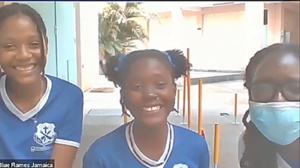
Preliminary Review of Robotics & Electronics Systems Olympiad Applications
After the close of the application period, submitted applications will be examined by the Judges during the Preliminaries Review Period (see CSO 2026 Agenda). Teams will not be meeting with the judges during the Preliminaries Review Period, so the PowerPoint presentations of the teams should not be submitted at this time. For those projects that move on to the Finals, their PowerPoint presentations must be submitted before the Finals (see CSO 2026 Agenda).
After the Preliminaries Review Period, the teams selected for the Finals by the judges will be notified. These teams may continue working on their projects up to the day of the Finals. All teams selected to compete in the Finals must attend a mandatory communication systems check (see CSO 2026 Agenda) to receive additional guidance and make sure that their communication systems are working properly (so that no team is disadvantaged during the Finals).
Finals of the Robotics & Electronic Systems Olympiad
Teams and individuals invited to the finals must submit the following items 7 days before the Robotics & Electronics Systems Olympiad:
- An updated video of your robot or electronics system demonstration
- A revised written description of your project
- A video of your team presenting your project. This video may have the same content as the team’s PowerPoint presentation and may include a demonstration of your robot or electronics system in action. This video will be played during the Finals if your team loses internet connectivity, is unable to present live or there is an unforeseen problem demonstrating your project live.
- At least one photo of your team working on the project (for advertising purposes)
At the finals of the Robotics & Electronics Systems Olympiad (see CSO 2026 Agenda), each team must:
- Present their robotics or electronics systems project from the same room using two computers, or a computer and a document camera.
- Teams must present their projects in such a way that all members of the team are visible and the robotics or electronics system is visible on at least one of the team member’s laptops.
- Give a PowerPoint presentation describing the problem or application being addressed, their project design approach, what it does, problems encountered and how they were resolved, etc., or show a pre-recorded updated video of their presentation – (5 min)
- Demonstrate their robot or electronics system in operation (with stills or video)- (5 min)
- Engage in Q&A with judges (10 min)
We expect almost equal participation from each team member. As a precaution, it is recommended that the finalists send a copy of the team’s PowerPoint presentation by 11:59 pm on the night before their presentation to applications.csf@gmail.com.

Video clips from the 2023 Robotics & Electronic Systems Olympiad can be found at the
CSO 2023 press release link’
The Judging criteria for the Robotics & Electronics Systems Olympiad include:
- How compelling is the project description (approach to the challenge and anticipated results/impact, etc.)
- Does the project seem like it could be completed in time for the Robotics & Electronics Systems Olympiad (Preliminary Review only)
- Technical merit, originality and inventiveness of project engineering/design
- Performance level of the robot or electronics system
- Performance/cost ratio for the robot or electronics systems project
(Finals only) - Potential marketability and potential for wider application of the project (entrepreneurial strength)
- Relevance of the project to addressing a challenge (technological, social, geographical, political, etc not necessarily of the Caribbean)
- Clarity of the presentation and how well the questions were answered by the team (Finals only)
- Accessibility of the files via the links provided
8.0 CSO 2026 REGISTRATION AND APPLICATION PROCESS
We strongly encourage applicants to form their teams and apply to the 2026 CSO early. Please note that the earlier you apply, the more likely you are to benefit (see Registering Early).
Registration for the 2026 CSO
The CSO are open to citizens of CARICOM and CARICOM-Associate countries (not observer countries) who meet one of the age requirements. The CSO are also open to residents who have been living in a CARICOM or CARICOM Associate country for the last 4 consecutive years, where January 15th of the year of the Olympiads is the benchmark for the end of the 4 year period. Eligible contestants are persons in the 13 to 21 age range on January 1st of the year of the Olympiads.
Before you begin registering for CSO 2026 please be sure to read the above Guidelines in their entirety. It is also very important that you read the Frequently Asked Questions (FAQs) below, as the FAQs contain additional important information not covered in the general Guidelines above, and it is very likely that any questions you have are already answered there.

A complete application consists of a minimum of 2 forms and a maximum of 4 forms submitted by the application deadline (30 November 2025):
Form 1 – Personal Registration. This form collects general biographic information including a photo of yourself and a photo of the biographic information on either your identification card, passport or birth certificate, and a photo of proof of residency if not a citizen of a CARICOM or CARICOM Associate country and be accessed here
Form 2 – Events Application and Declarations. To participate in one or more events in the Caribbean STEM Olympiads, applicant must fill out Form 2. The link to Form 2 is accessible only after Form 1 is submitted.
Form 3 – Institution Endorsement Form. This form is required only for teams representing their school/club/institution. The Form 3 deadline is also 30 November 2025. The link to Form 3 will be shared only with the teacher/coach/principal/administrator specified by the team leader or individual applicant on Form 2.
Form 4 – Financial Assistance Form. This form is to be used for requesting financial assistance. It is for Robotics & Electronics Systems applicants who are financially needy, have at a minimum completed Forms 1 and 2, and have made verifiable progress on their robot or electronics system. The link to Form 4 (Financial Assistance Form) will be shared directly with the team leader or individual applicant entering the Robotics & Electronics Systems Olympiad. The Form 4 submission deadline is 15 October 2025.
Form 1: Personal Registration Form
Form 1 asks for information such as your date of birth, contact information etc. As part of Form 1 you will also need to submit a photo of yourself and a photo of the biographic side/page of your identification card, passport or birth certificate, and if necessary, a photo of proof of residency. After you register using Form 1, you will be given access to Form 2 (Events Application and Declarations Form) if CSF determines that Form 1 is filled out accurately, completely and truthfully. Please note that Form 1 will be locked after you hit the SUBMIT button. This means that you will not be able to go back and make changes. So please recheck Form 1 over and over again before submitting it.
As you fill out Form 1:
- Please make sure the content in your attachments is upright and legible. Attachments with the content upside down on the page will annoy most reviewers.
- Make sure your full name (i.e., first and last names) appears on all supplementary documents/attachments you submit to us. Also, please name your attachments to reflect their contents. We suggest you name your attachments using the following format “CSO-2026-LastName, FirstName-DocumentName.pdf”. Attachments with file names such as “scan 001” could cause your attachment to be misfiled. If this happens, your submission will be deemed incomplete.
Here is your online access to FORM 1 (PERSONAL REGISTRATION FORM).
Should you encounter challenges filling out the Application Form, and for assistance you should email applications.csf@gmail.com with the words “CSO Application Assistance” in the subject line of your e-mail. Incomplete, inaccurate, untruthful or late Forms 1 & 2 will be rejected.
Form 2: Events Application and Declarations Form
After you have completed your personal registration (Form 1), the CSF will check to see that Form 1 is properly filled out before giving you personalized access to Form 2. Access to Form 2 will be via the same e-mail address that you used for Form 1.
Please note that:
- On Form 2 you will need to provide details about the event(s) you will be entering, your team name, etc. Also, on Form 2 your team leader will confirm the team name and team members, and provide the project description, project links etc.
- Form 2 also contains the media consent declaration. Please note that if you are under 18 years of age, your parent or guardian will need to give their consent for you to participate in any of the CSO events. We reserve the right to check with your parent or guardian.
- Once you submit Form 2, you will receive an email from Google Forms which includes your responses to the questions. Please review your answers. If you have made an error on your form, you can use the “Edit response” button in the email to make changes to your application up to or before the Events Application deadline. If you need to edit Form 2, you must use the same email address you used in your initial submission of Form 1 and Form 2.
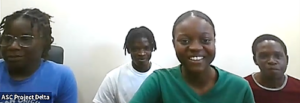
Form 3: Institution Endorsement Form
Teams or individuals entering the Caribbean STEM Olympiads may represent themselves (independent) or may represent their school/club/institution. For a team to be recognized as representing a school/club/institution, the team must be formally endorsed by the school/club/institution via Form 3. Please note that each institution will be limited to one team per event. Equal admission preference will be given to all applicants. The CSF reserves the right to confirm the endorsement of the school/club/institution. The link to Form 3 will be shared only with the teacher/coach/principal/administrator specified by the team leader or individual applicant on Form 2.
Form 4: Financial Assistance Form
A limited amount of funds is available to provide financial assistance to the neediest teams entering the Robotics & Electronics Systems Olympiad who have made substantial progress at the time of application. The purpose of the funds is to assist the neediest teams in acquiring materials and components early enough to advance their projects. The team leader may apply for financial assistance by submitting Form 4 – Financial Assistance Form which can be accessed via a link that will be provided after the submission of each team member’s Form 1 and Form 2. Submitting this form is optional since not all Robotics & Electronics Systems applicants will need or will qualify for financial assistance. Projects granted financial assistance are not automatically admitted to the finals. The link to Form 4 – Financial Assistance will be shared directly with the team leader or individual applicant entering the Robotics & Electronics Systems Olympiad. The Form 4 deadline is 15 October 2025.
In addition to Form 4, all applicants for financial assistance must have a recommendation, preferably on institutional letterhead, from a teacher/coach/mentor/ guidance counsellor/other appropriate person sent to applications.csf@gmail.com verifying the team’s need for financial assistance.
9.0 FREQUENTLY ASKED QUESTIONS
-
Eligibility
- In order to participate in the Math Olympiad, do you have to have citizenship for the country you would like to compete for? Or can you have just lived there for a number of years?
- Are high school students the only ones that will participate in the Olympiads?
- Some secondary students are 11 years old. Will they be allowed to participate?
- How do I enter the Caribbean STEM Olympiad events?
- The Application Form has many pages, will I need to fill out all sections of the Application Form?
- When is the application deadline?
- Is there a registration fee for the events?
- I think I made an error on my form, can I go back and edit?
- For the question on the Application Form which asks for a team name, what would an individual applicant do? Do they simply have to put their own name?
- Why should I participate in the Olympiads?
- Why does the CSF need a picture of the applicant, identification card or birth certificate?
- How are the judges selected?
- Where will the Olympiads be held?
- Will the finals of the various events be televised/streamed?
- If I create something that is innovative, must I share the rights to own, use and commercialise with the CSO organisers?
- What arrangements are being made to accommodate persons with disabilities?
- If I am representing a school/club/institution. Does the school/club/institution need to submit anything?
- Can there be more than one team from a school? What if the school has a team and the math club has a separate team?
- Can a private academy, club or association enter the Olympiads, and if so, how many students can enter?
- What is the maximum number of students who can enter from a school?
- What if an institution operates in several countries?
- Where can I find the link for my teacher or coach to fill out?
- Can students compete in age levels above the level in which their age falls?
- Is it possible to compete in multiple levels for the same category?
- What if the majority of my teammates are older than 16 but there is one member younger than 16. Would that younger member still be able to compete in the same level as us?
- Is it possible for an individual or a team to participate in more than one event?
- Are there 3 persons per team or 4 persons per team?
- If I am on a team, and find that I am unable to attend the Finals, can someone substitute for me?
- I know that the website mentions we need good connectivity for the events but in the case of an unforeseen outage, would there be provision for a team to have a make-up session afterwards?
- What day would the elimination rounds of the Computer Coding Olympiad be? Because there may be issues with having all team members in the same room.
- What is CSO’s stance on the use of generative AI tools such as ChatGPT in the Math Olympiad?
- Will there be any sample questions released to give the students an idea of the type of questions they will be asked in their level in the Math Olympiad?
- For the Math Olympiad, would there be a certain number of questions a team can answer or will it finish when the board is cleared?
- How is the scoring done in the Math Olympiad when there are 3 people on a team?
- Will I need to bring my calculator to the Math Olympiad?
- Will there be a meeting/opportunity where we can see some of the robots or coding projects from past Olympiads?
- For the Coding Olympiad and the Robotics & Electronics Systems Olympiad, when I’m submitting my application, where should I send my code and my videos?
- What is CSO’s stance on the use of generative AI tools such as ChatGPT to create code for projects in the Computer Coding Olympiad?
- Can you kindly tell us the difference between scratch coding vs no scratch?
- I know that we need to submit write ups for our Coding Olympiads project by the application deadline, but do we need to also make a demo of the project by then as well?
- A description of your solution to your chosen challenge
- A user-friendly link to the file(s) for your code and website/ game/ video/ App as appropriate. Links should be submitted for both the back-end of the code and the front-end/a demonstration of what a user of your website/ game/ video/ App would see. Please ensure that the link(s) to your code can be easily opened by commonly available software.
- Can the Computer Coding Olympiad emphasize solutions that already exist?
- Is a game spreading awareness about a certain topic considered an enabling component to a solution of a challenge of the Region?
- For the Level III Computer Coding Olympiad, are the software solutions required to be in Python or can any programming language be used?
- Can students submit any kind of python application (e.g., a game with PyGame, Web application with a Python web framework, or a data science notebook with an analysis)?
- Are there any restrictions to the Computer Coding Olympiad (e.g., regarding graphics, complexity/simplicity) and are abstract concepts allowed, etc.?
- Are pre-recorded videos required for coding? If so, should it be of the actual game/ app to be demonstrated?
- What is CSO’s stance on the use of generative AI tools such as ChatGPT to create code for projects in the Robotics & Electronics Olympiad?
- Will the CSF be providing robots or robotic kits to competitors
- What kinds of projects are most competitive as entries for Electronics Systems
- Do you want to see our robot fully finished when submitting on or before the Robotics & Electronics Systems Application deadline or just a startup of our robot build?
- Does the CSF want to see the type of coding the robot will be using in the project description on or before the Robotics & Electronics Systems Application deadline?
- For the Level III Robotics & Electronics Systems Olympiad, would it be possible to build the robot from parts taken from a starter kit of parts such as the REV Robotics starter kits?
- Do I need to include the cost of parts that are 3-D printed?
- Do the shipping costs for parts for my robot need to be included?
- Do the challenges of the Region for the Coding Olympiad also apply to the Robotics & Electronics Systems Olympiad?
In the Caribbean STEM Olympiads (CSO), we do not think of your participation as competing for a country. The CSO are open to citizens of CARICOM and CARICOM-Associate countries (not observer countries) who meet one of the age requirements. The CSO are also open to residents who have been living in a CARICOM or CARICOM Associate country for the last 4 consecutive years, where January 15th of the year of the Olympiads is the benchmark for the end of the 4 year period. In either case you must submit proof (see CSO 2026 Registration and Application Process).
No. Anyone or any team who meets the age and citizen requirements can enter.
To be eligible for participation in the 2026 Caribbean STEM Olympiads, all persons must be 13 years or older on or before January 1st of the year of the Olympiad to which they are applying.
Deadline and Application Forms
You should begin by reading all the information on the Webpage to get an understanding of what the CSO is about, and its rules and regulations. Thereafter you can take the next step and fill out the online FORM 1 (Personal Registration Form.)
Should you encounter challenges filling out Form 1, for assistance you should email applications.csf@gmail.com with “CSO Application Assistance” in the subject line of your e-mail.
After you submit Form 1, then the CSF will make Form 2 (Events Application & Declarations Form) accessible and Form 2 must also be filled out and submitted.
The application forms were designed in such a way that you will only need to fill out the sections relevant to you. However, each applicant must submit both Form 1 (Personal Registration Form) and Form 2 (Events Application and Declaration Form). There are ‘Checkpoints’ built into Form 2 to help guide you.
See the CSO Agenda section above.
No. There is no registration fee for the Caribbean STEM Olympiads.
Form 1 (Personal Registration) cannot be edited after submission. However, your Form 2 (Events Application and Declaration Form) remains editable until your event application deadline. After you submit Form 2 you will receive an email from Google Forms which includes your responses to the questions.
For the team name, an individual can either use their real name or make up a name to be used during the Finals.
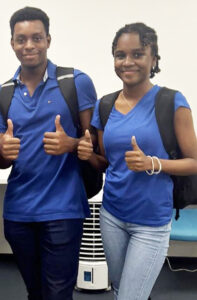
General CSO Questions
It can be fun. It gives you regional recognition for your academic accomplishment. It looks good on your resume if you are a finalist – this could enhance your university applications and may distinguish you from others in a job application.
Many of our sponsors want to know how we spend their funding. For example, some often want to know the age groups, the percentage of females, the countries of the participants, and many want photographs of the participants in action to put in their newsletters or in their annual reports to their stockholders. As you can imagine, the CSF is required to provide such information (in aggregate) in its final narrative and financial reports to some of the sponsors. Having a picture of the applicant before the event is also a method of verifying that the applicant is the same person appearing in the event. Please be assured that the CSF is respectful of and safeguards the personal information of all individuals participating in its programs, as reflected in its Participant Privacy Pledge.
The judges for the events will be experts in their fields who have been carefully screened so they have no conflict of interest. They will be selected from the private sector, universities and the government sector, and the audience in some special cases. Persons interested in serving as judges should send an e-mail to warde.csf@gmail.com specifying the event on which they are offering to serve as judge, along with a recent copy of their CV as an attachment. If the CV does not have much detail, a separate paragraph explaining their experience or qualifications would be helpful.
All the CSO Events will be held virtually (see the CSO Agenda for the Zoom Links).
Yes. See the CSO Agenda for more information and Zoom links to the finals.
For your entries to the Computer Coding Olympiad, the CSF will not claim any rights in your invention. If you feel strongly that you have a proprietary and/or confidential solution, you must choose whether or not you want to enter your solution into the Olympiads as you may end up disclosing your solution. The CSF has no means of protecting your information once you share it in the Olympiads. The downside of not presenting is that you may miss an opportunity for funding your project if an interested prospective investor is in the audience.
The CSF regrets that it does not have enough resources to assist persons with speaking or hearing disabilities, or persons whose command of English is not strong.
Teachers/School/Multinational Institutions
Yes. For an individual or a team to be considered as officially representing a school/club/institution, Form 3 (Institution Endorsement Form) must be filled out by a Principal, STEM teacher/coach or appropriate administrator indicating the institution’s endorsement and support. The form is sent directly to the endorser (teacher/coach/principal) indicated by the team leader on Form 2. The CSF reserves the right to confirm the endorsement of the school/club/institution.
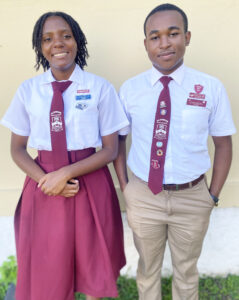
Let us assume the Math Club is a school initiative. Then the CSF will not treat the Math Club as an entity that is separate and distinct from the school.
Yes. We would treat the academy, club or association in the same way we treat a school. Schools may “send” or assist teams to enter the CSO. If a school was able to “send” students to all possible events, the maximum number of students from that school who could apply would be 33. Because of the elimination rounds, the number would likely be smaller by the time they reach the finals. Also, the medal certificates and prizes are intended to be personal property of the students (not the school).
A school is not allowed to enter more than 1 team per event (so 1 team per age range per category). With this restriction, a school can enter only up to a maximum of 33 different students as follows into the CSO. That is: for the Math Olympiad up to 3 different students in each of the three different age levels, for the Computer Coding Olympiad up to 4 different students in each of the three different age levels, and for the Robotics & Electronics Systems Olympiad up to 4 different students in each of the three different age levels.
The CSF will treat the activities of a multinational institution in each country it operates in as separate entities. As an example, the arm of the institution in Trinidad and Tobago will be allowed to enter one team per event (so 1 team per age range per category), in accordance with the guidelines for entries representing institutions. The arm of the same institution operating in Barbados may also be allowed to enter one team per event, and so on. Please note, multi-national teams may be allowed only in the Computer Coding Olympiad.
Even though the name and e-mail address of your teacher, coach or principal may appear on the Application Form, your teacher or coach does NOT fill out Form 1 or Form 2. If you are representing your school, then a teacher/coach/principal or suitable school administrator must fill out Form 3 (Institution Endorsement Form) to endorse teams that are representing their school/club/Association. The link to Form 3 will be sent directly to the teacher/coach/principal or administrator indicated by the team leader on Form 2.
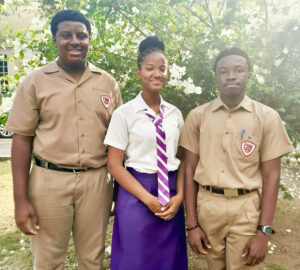
Entering Multiple Events/Levels
Yes. Applicants may participate in the level immediately above that associated with their age range.
No, participants are limited to one level per category.
Yes. Applicants may participate in the level immediately above that associated with their age range.
Yes.Yes. An individual or team can participate in all 3 categories (Math Olympiad, Computer Coding Olympiad, Robotics & Electronics Systems Olympiad) events within their age range. Also, applicants may participate in the level immediately above that associated with their age range if they choose not to participate in the event at their age level. Applicants are not allowed to participate in the same category more than once.
General Questions about the Events
Math Olympiad teams can have up to 3 persons per team, and CSF Computer Coding Olympiad and Robotics & Electronics Systems Olympiad can have up to 4 persons per team.
Substitutions can be made up to the start of the preliminary rounds (see CSO Agenda). For all substitutions, both the person being substituted and the substituting person, must notify the CSF of the change via an email to applications.csf@gmail.com. If the registration deadline has not passed, the substituting person must fill out Form 1 (Personal Registration) as well as Form 2 (Events Application and Declarations) which will become available after Form 1 is completed. If the application deadline has passed, the forms will no longer be available. In this case, the CSF will provide instructions on how to proceed. All substitutions must meet the citizenship (or residence) requirement and age requirement for the particular level. All substitutions are subject to approval by the CSF.
No make up sessions are possible. To solve this challenge, all teams in the Computer Coding Olympiad and Robotics & Electronic Systems Olympiad MUST submit updated copies of their robotics or electronics systems video or game, App, or Website, (along with the other required documents) as appropriate, to the CSF (applications.csf@gmail.com) before the finals. This way if a team loses power or Internet connectivity, we can run their video and show their descriptions so they will not be at a disadvantage. On the webpage, please see the guidelines for both the Computer Coding Olympiad and the Robotics & Electronics Systems Olympiad. If connectivity is lost during the Math Olympiad, a grace period of 5 minutes is allowed after which rejoining the event is at the judges’ discretion.
The Computer Coding Olympiad and the Robotics & Electronics Systems Olympiad have a review period (refer to the Agenda) after which teams will be selected to participate in the finals. Applicants do not interact with the judges at this point. For the Math Olympiad, a schedule for the preliminary rounds will be sent to all teams who submitted a complete application to establish team availability. However, team members MUST be in the same physical room at the same time for: (1) all preliminary rounds, and (2) all final rounds of all events, except in the case of the Computer Coding events where participants are allowed to be in different countries. In this special case, participants must be in the same virtual room at the same time for all the above-listed activities.
Questions Related to the Math Olympiad
Please note that the use of generative artificial intelligence (AI) tools in the Math Olympiad is strictly not allowed, and its use is grounds for disqualification.
Currently, there are some sample questions on the Website under “Some Reference Materials for the Math Olympiad”. We are planning to add and sometimes replace sample questions from time to time. You can be guided by the CSEC and CAPE syllabi as they apply to the three different age levels. Also, you may want to use the list of free on-line resources (books and websites) also highlighted under “Some Reference Materials for the Math Olympiad”.
There is a set number of questions a team will be required to answer with a different amount of time allotted per question depending on the complexity. A guide will be provided to all Math Olympiad applicants on how to use the software, the number of devices required and how to use them, the judging criteria, and the steps as to how the Math Olympiad events will unfold.

During the Math Olympiad, anyone on the team can answer the question posed. The credit always goes to the team and is not assigned to any particular individual.
No. The CSO questions are designed such that calculators will not be needed. Numerical answers do not have to be reduced to their simplest form. The questions are designed to test your critical and analytical skills, and the judges can give substantial partial credit for incorrect final answers that have the correct logical and analytical approach. Individuals or teams caught using calculators or the calculator software on their computers will be disqualified from the Olympiad.
Video clips from the 2023 CSO can be found in the 2023 press release.
We strongly recommend that you use a repository such as Google Drive or Dropbox to store your video demonstration and photos, and then include that link in the Application Form. To make sure we get it, please also share the link with applications.csf@gmail.com and with csfhdq@gmail.com. Your link(s) will be shared only with the judges.
A WORD OF CAUTION: The judges will be very busy as we anticipate a large number of applications. The judges will not download and install specialty software to run your apps, website or games. It is up to you to take the time to repackage your submission so it does not annoy the judges and cause them to skip your application. In other words, please make your submission as user friendly as possible (No more than 3 clicks are recommended).
More Questions Related to the Coding Olympiad
The use of generative AI tools is not restricted in the Computer Coding Olympiad. However, the preference is for participants to write as much of the code themselves, to the extent possible. Innovativeness and inventiveness are major criteria in the judging process, and the generous use of generative AI tools will not add much to the innovativeness component of your team’s score. The judges keep abreast of advancements of generative AI technology and can easily spot where AI tools have been used in coding. If you choose to use AI, it is recommended that you share what exactly was used, how its use helped you to better focus on achieving results, and clearly indicate where you implemented your own innovation. Please note that the use of AI tools in the Math Olympiad is grounds for disqualification.
Scratch is a user-friendly software that is easy to learn and that the Level I computer coding students can use. “No Scratch” in this context means that scratch is not allowed for use by Levels II and III students.
By the Coding Events application deadline, applicants will need to submit:
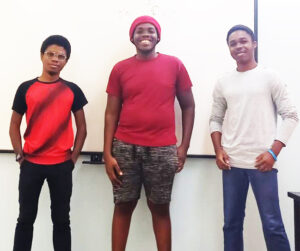
Keep in mind that the judges are looking for innovative and novel solutions to any one of the challenges posed. This means that if your solution is incremental over what has already been done, it may not be very persuasive or competitive.
Yes.
Level III Computer Programming software can use any high-level programming language. Scratch, for example, is not allowed in Level III (or Level II).
Yes, but also keep in mind that a large component of your score is based on the effectiveness of your proposed project in enabling a solution to a challenge of the Caribbean region.
The only restrictions are that Scratch is not the software of choice for Levels II and III. However, keep in mind that a large component of your score is based on the effectiveness of your proposed project in enabling a solution to a challenge of the Caribbean region. So the practicality of your solution will weigh heavily in how the judges see the merits of your solution.
In the application form there are separate sections for persons to submit their code and what the code should control/produce. It is recommended to use whichever media (still images or videos etc.) will give you the most convincing submission.
More Questions Related to the Robotics & Electronics Systems Olympiad
The use of generative AI tools is not restricted in the Robotics & Electronics Olympiad. However, the preference is for participants to write as much of the code themselves, to the extent possible. Innovativeness and inventiveness are major criteria in the judging process, and the generous use of generative AI tools will not add much to the innovativeness component of your team’s score. The judges keep abreast of advancements of generative AI technology and can easily spot where AI tools have been used in coding. If you choose to use AI, it is recommended that you share what exactly was used, how its use helped you to better focus on achieving results, and clearly indicate where you implemented your own innovation. Please note that the use of AI tools in the Math Olympiad is grounds for disqualification.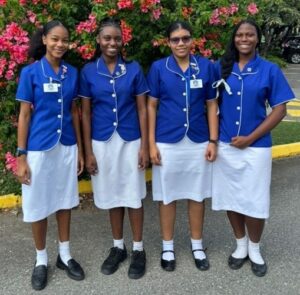
No. The operating budget of the CSF is too small to provide such assistance. However, financial assistance may be provided to the most-needy teams that start immediately by pre-registering and filling out Form 3 (Financial Assistance Form) – see “Financial Assistance For Needy Robotics Teams” above.
Electronics Systems entries are expected to solve a problem (not necessarily one challenging the Caribbean). The applicants must make clear to the judges what problem is being solved and its importance. Innovativeness and efficacy of the solution, and commercial potential are among the attributes that the judges value most.
No, your robot does not have to be finished at the time of the application deadline. 1. We just want to see how far along you are. If you are not very far along, you may not be admitted to the Finals. So show us as much as you can so there is no misunderstanding (see the Guidelines for the The 2026 CSF Robotics & Electronics Systems Olympiad for details).
For the Robotics & Electronics Systems Olympiad, the CSF is less interested in the code the robot or electronics system employs and more interested in the performance. So, by the application deadline, what the CSF is really looking for is a video of your robot or electronics system doing something, even something preliminary. Your submission at that time should be aimed at convincing the CSF that you have started and could have a reasonably good performing robot or electronics system by the time the Finals start (see The 2026 Robotics & Electronics Systems Olympiad for details).
Kits that consist of a bunch of parts that are not of the snap-to-build type are allowed in Level III. As an example, the REV-45-1883 is not a snap together kit, falls under the US$ 700 cost limit, and thus is allowed for use in Level III. It is best to check with the CSF in advance to make sure that parts you purchase for your robot are allowed. The judges will be looking for innovation, so if a team simply builds something that is a standard recommendation with such a kit, it may not be competitive enough.
No. Parts that have been 3-D printed do not count to the total cost limit for the robots and do not need to be listed in the parts list.
No. Shipping costs do not need to be included in the parts list nor in the total cost of the robot.
No. However, robots that attempt to solve a challenge of the Region should be submitted under the Robotics & Electronics Systems Olympiad, rather than under the Computer Coding Olympiad. However, the Electronics Systems entries must attempt to solve a problem and the importance of the problem must be pointed out by the team.

10.0 CONTACT US
For more information on the Caribbean Science Foundation (CSF) and questions about the Caribbean STEM Olympiads (CSO), you can reach us at:
● Telephone: 1(246)417-7493
● Email: applications.csf@gmail.com
● Website: https://caribbeanscience.org/
You can also find us on social media at:
■ Instagram: @caribbeanscience
■ Facebook: @CaribbeanScienceFoundation


